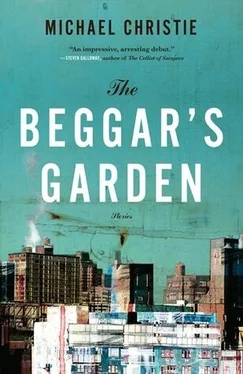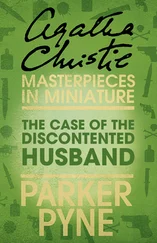Saul kissed the great scar that he’d once feared but now saw as a badge of boundless strength and perseverance. Then someone cut gravity in half. His feet were level with his head. King Saul heard someone who sounded exactly like himself ask Luis what was happening and Luis replied that everything would be all right all right all right and Saul was comforted by this exchange. He could see now that a whole group of them were carrying him aloft. Saul could hear the river licking the windows. He could hear cheering and the call of a trumpet in the close distance. They were taking him to the apartment in West Lawn to prepare for the Electrifying Conclusion and he felt himself loose a great bellow of triumph.
Saul watched the Dayroom recede from him and spoke tender words to Ada who he could see now had joined the ranks of those who bore him, her intricate hand in his own and the other pressed in the hollow of his knee. He regarded her twinkling face and told her that upon his return this kingdom would be more different than even they could ever imagine. The TV Room passed into his view and inside was Georgina slumped in her wheelchair amidst a gentle rain, dangling her small stunted head toward him, drizzling a shot-glass amount of drool into her lap. King Saul instructed his subjects to halt and grasped at the doorframe. She lifted her head, her stringy hair cast sopping across her gorgeous face, and fixed her deadened eyes to his. Georgina then uttered something so startling in its profundity, so divinely beautiful to King Saul’s ears, that he feared it would light the rain on fire with its magnificence.
“Roob,” she said.
Tonight he’d plucked an emerald green Benz S600 from the spiralling garage of the Queen Elizabeth Theatre. The sky hung with violet dregs of twilight, and a recent rain was held by tire ruts worn in the pavement like the prints of snakes. Finch piloted the Benz over the stately Lions Gate Bridge, up some switchbacking mountain roads to a turnout with a clear view of the city. He parked, mindful to leave the Benz running — it wouldn’t start again without Stanislaw’s laptop. He discovered a set of pristine golf clubs in the trunk and hit nearly thirty balls from the cliff out into the inlet. This took an hour: he held the tall clubs below the grips, took four swings at each, murmured boom with the miracle of each connection.
On his way down, he dropped the stick in neutral, retracted the sunroof, stood, and coasted with his head in the jet-engine wash of night air until his eyes went gummy and his lips recoiled like the muscled dogs Jerzy kept in their yard. Sitting down, he found the sedan’s stillness and grace so deliciously amplified in the aftermath of the roar he executed a jerky three-point turn near a curve and climbed back up to do it again.
While Jerzy and his boys preferred the growling flutes of Japanese or Italian design — sleek as swelling waves and painted in lipstick sheens — Finch liked the quiet ones. Sedans mostly, executive models, the kind that diplomats were chauffeured around in, the kind with classical music in their television ads, cars so noiseless, so painstakingly designed to hush even the meticulous whirring of their own engines, they floated with the elegance of celestial things.
Finch took his first when he was twelve and emboldened by the sort of confidence that only youth can prop up. It was his brother, Jerzy, who’d retracted the slim jim and swung the door out like a valet. “You going from BMX straight to BMW, Ostrich,” Jerzy said as Finch climbed into the leathery cockpit. Though he’d begged his brother mercilessly for the opportunity, Finch had never before operated an automobile — not counting arcade games you sat in. That first night, Finch ground the BMW’s gears for ten whole minutes while the others bent at their waists laughing, until finally he hopscotched the car out from beneath the buzzing amber of the lot.
He’d driven hundreds since. Getting them was no problem. The expensive ones didn’t even use keys anymore. They were too good for keys, as if keys somehow tainted a driver’s hand. Stanislaw programmed laptops to open them. Twenty minutes near one was enough — digits and letters flipping on the screen with a shimmering speed.
Tonight, it was only twelve minutes before the locks of the emerald Benz thumped and the engine came alive.
“It’s your brand, I’m right?” Jerzy said before Finch went for the car, a weighty hand on his shoulder. “But this time no tour.” Finch nodded.
“Where do you go with them?” Jerzy said.
“Nowhere.”
“What? Speak up.”
“Nowhere,” Finch said, not much louder.
“What’s this mouse-talking? Are you unhappy, mouse? Maybe you have a girl?”
Finch sunk his hands into his track-pant pockets.
Jerzy regarded him sideways, a grin turning on his lips. “It’s no problem if you do. It would explain much.”
“No girl,” Finch whispered.
“Okay, no girl. Then you tell me, Robin, where do you go?”
Finch knew that once his brother got his teeth into something like this he would not relent. Growing up, Finch had seen him take hideous beatings from bigger kids, men even, because he wouldn’t let something drop, once by a giant sauntering man who’d let a door swing closed on them at a movie theatre.
“I just like driving, that all right with you?” Finch said, sloughing the hand from his shoulder.
Jerzy laughed and cupped the back of Finch’s neck to force an interval of eye contact. Like Finch, he was still a boy, really, but his eyes looked pleading and perennially tired like a pair of deflated blue balloons. Jerzy turned to spit through his teeth on the concrete floor. Finch saw Stanislaw shoot a panicked look to the stairwell.
“Well this time, my feisty driver-bird, no tour,” Jerzy said. “We need to flip this one quick. There’s people we need to pay.”
He released Finch’s neck. “At home in one hour. Not until everything is cool and clean.”
Twelve a.m. by the dashboard clock and Finch was back in the city, giddy and ecstatic, his shoulders taut from swinging the clubs. He’d found four hundreds, crisp and brown like book-pressed leaves, folded into a golf scorecard in the console. Betting money, he figured. He’d seen greater sums piled on his kitchen table and never taken notice, but those bills had not been his own. All he could imagine buying was a ping-pong table they lacked room for, so he resolved to keep thinking.
He drove five under, captivated by the pavement’s glisten and the innumerable signs — the Benz an exquisitely tailored coat he wore. He squirmed and adjusted the pillow he’d brought to boost him. Back when Jerzy took cars, his brother brought CDs — soaring orchestral samples over subsonic bass eruptions peppered by barking lyrics baroquely detailing the joys of wealth — that he let ring from opened windows with a strange pride. But it wasn’t just rap. It was all music. It grated Finch, seemed to demand a response he could not give. As long as he could remember, he’d found contentment in the world’s quiet places — pillow forts, closets, churches he’d visited as a boy with his father in Łódź—but nothing compared to the sedans. And their stillness was movable: you could take it anywhere in the city you chose, especially when it was late, with the roads empty as fresh sheets of black paper.
After a couple more hours of aimless, blissful driving, Finch arrived home to see a few of Jerzy’s boys on the porch, bottles of Żywiec pendulous in their hands. The Benz insulated him from the thud of bass, but Finch could see it flexing the picture window of their house.
He should have killed the engine, but he needed to feel it. He half-yawned and removed his glasses to rub his eyes. He was beyond late. Jerzy would be more scathing with his boys looking on. It was doubtful Jerzy needed money. He’d always got paid, even in bad times. Four years previous, when Jerzy was fourteen and Finch was ten, their father, who worked security at the airport, was killed in a dispute out front of a nightclub. The hospital called and they spoke to Jerzy, who passed the cordless from one hand to the other like it’d just come out of the oven, clearing his throat mechanically. They had waited weeks for someone to come. When nobody did, they’d simply carried on. Jerzy had been a goofy, raucous boy, but this ended when he became their guardian. He built a bunk bed out of two weather-beaten doors they found in the basement and made Finch sleep above him in his room. He quit school, sold stereos, gram bags, bikes, shoes, fake pills, even umbrellas for a while — all of which he kept padlocked in Finch’s old bedroom. This was before he ordered a fifty-two-piece lockout toolkit online and moved on to cars.
Читать дальше












